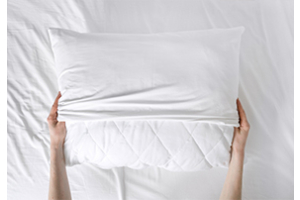What’s Your Life Purpose? Explained

Our Life’s Purpose. The Reason We Get Up In The Morning.
It would seem that it works both ways. When we are happily engaged and focused in our daily lives, we are more likely to sleep better. And when we consistently enjoy good sleep, we are most likely to begin each day re-energised, full of intent and purpose.
Having a positive, whole and connected sense of self is key to our mental wellbeing. It is also important for sustaining our thoughts, ideas and aspirations for the longer term. When we are driven by a vocation or a life calling, the stamina and continuity to sustain and realise our dreams has to come from somewhere.
Sleeping the dream.
An ideal is rarely something we just happen to live. Living our dream requires focus, dedication and, yes, a concrete sense of an end goal. Talent, hard work, and perhaps a bit of luck along the way, will help. But who would honestly factor a proper night’s sleep, every night, as perhaps the most essential influence on reaching the successes we hope to achieve?
Regularly we read and hear about how the success of high-profile trailblazers in business, sciences, artistic endeavour, or whatever game changing career they pursue, comes down to “putting in the extra hours”, “burning candles at both ends”, “making the sacrifices”, “the opportunity cost”.
Sleep Scientist, Dr Dale Rae, has extensive experience in guiding aspiring young athletes in how to integrate an effective sleep regime into their training programme. “Not to be too simplistic,” shares Dr Rae, “but all the hard work and dietary discipline you put in during the day is of little effect if your mind and body do not process all that effort and dedication at night time.”
“It is during sleep that we reap the rewards of our dedicated training, practice and learning. This is when our bodies repair and strengthen after an intense training session. It’s when our brains consolidate and store the important information we’ve taken in for the day.”
Sleeping to be “fit for purpose”.
“Let’s be real for a moment,” says Dr Rae. “We’re not all going for an Olympic medal, destined for fame and fortune, or trying to take over the world. What we ideally want to strive for is a meaningful, rewarding lifestyle. As a Sleep Scientist, I consult with people from all walks of life. Often, our Sleep Science team is contacted because someone suddenly realises that they have persistently interrupted sleep, or possibly an ongoing sleep disorder that is affecting their quality of life. Or perhaps it’s their lifestyle that is affecting the quality of their sleep.”
“Not all people with disordered sleep (essentially poor sleep that could be remedied) suffer from full blown sleep disorders. Careful review and attention to daytime lifestyle patterns and habits, as well as physical and mental health, often reveal tell-tale signs we look for to determine appropriate sleep solutions.”
What purpose does sleep serve?
Dr Rae explains the vital processes that take place in our brains and bodies when we sleep.
Every night, we fall asleep by entering a state of unconsciousness and, during rapid-eye movement (REM) sleep, even some muscle paralysis. People often erroneously assume that our bodies simply do nothing and just rest when we sleep, but there is certainly a great deal of ‘action’ taking place when we sleep. The human body is a fascinating machine.
“Sleep is regulated by our natural body clock, or what we call our circadian rhythm. We all have our own, innate body clocks. Some of us sleep earlier and wake earlier. Others tend to sleep later and prefer waking later. Our brains are attuned to light signals that tell us when we should be awake and when we should be sleeping. At night, darkness initiates the release of the hormone melatonin. This prepares our mind and body for rest.”
“We then move through three stages of non-REM sleep, progressing from lighter sleep to deeper sleep, usually followed by a bout of REM sleep. On average a single cycle of non-REM/REM sleep takes about 90 – 120 minutes, and we complete four or five cycles through the night.”
During the second two stages of non-REM sleep, our breathing and heartbeat slows down. Body temperature decreases. We might even feel a twitch or two as our muscles relax. As we fall into deeper sleep, our brainwaves slow down. Growth hormones are released to repair and replenish bones and muscle tissue and our immune systems are very busy. In fact, you would be amazed at the amount of “housekeeping” that takes place in your body while you sleep. During REM sleep, our brains are incredibly active and look very similar to an awake brain. This is the stage of sleep often associated with dreaming. Paralysis of most of our skeletal muscles sets in so that we don’t involuntarily act out our dreams but our eyes dart back and forth almost as though we’re “seeing” the illusions that our minds conjure up.
So, as we now know, sleep is far from being a non-event. It is a highly tuned process and critical activity. It is during sleep that we store memories from the day before. This is important for learning and subsequent recall. We also make sense of our feelings and experiences from the preceding day, making sleep so important for our ability to regulate our mood and emotions. Simply put, if we want to understand what sustains and motivates our daily lives, it is proper, restorative sleep that certainly helps with a continuity of purpose.
Be sleep smart.
Getting proper sleep helps to make our waking hours more productive. When we are fully alert and focused, we are likely to achieve more in less time. If we sleep with purpose, we are more likely to live with purpose.
Of course, there are going to be times when we need to put in those extra hours. But depriving ourselves of regular, good quality sleep will eventually impact our concentration and level of productivity.
Everyone has their own sleep need and circadian rhythm. For adults between ages 18 and 64, somewhere between 7-9 hours of sleep per night is recommended. We should certainly be wary of “high achievers” who pride themselves on "getting by" on 4 hours of sleep a night. It may sound impressive, but it can eventually have health implications. And our health is perhaps the most important factor when realising our dreams.
Shop with purpose at Dial•a•Bed.
Talented, driven achievers know what they want. They’re heavily invested in their pursuits and passions. If sleep is so integral to goals and purpose, then surely a quintessential investment is the perfectly engineered mattress. At Dial•a•Bed you can be as particular as you need to be in finding the right mattress. Dial•a•Bed stocks South Africa’s leading bed brands, with every level of design and comfort to support even the biggest dreams. Start your sleep quest at www.dialabed.co.za.
If you suspect that you’re not getting your optimal sleep, or you feel that the quality of your sleep could be improved, contact the Sleep Science team at www.sleepscience.co.za. Sometimes it could be the simplest solution that can have the most meaningful, purposeful impact. #SleepForLife.
TAKE CARE: Lifestyle recommendation is not medical advice. Always consult your healthcare professional should you be experiencing prolonged sleep difficulties or related health issues.






